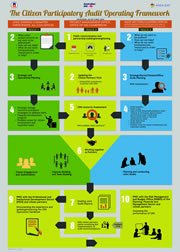Lead authors: Vien Suerte-Cortez (ANSA-EAP) & Carolina Cornejo (ACIJ)
Contributing authors: Carolina Vaira , Hirut M'cleod, Manuel E. Contreras (World Bank)
- Module 03
- Partnership building
- CPA experience in the Philippines
CPA experience in the Philippines
The Citizen Participatory Audit (CPA) project goal was to institutionalize the engagement between the Philippines’ Commission on Audit (COA) staff and citizens on participatory audit. The overall outcome was to pilot citizen-government partnerships to support the institutionalization of participatory audit in COA. Intermediate outcomes focused on establishing (1) an enabling framework, and a (2) enabling civil society to articulate its citizen agenda.
The CPA project officially started in November 26, 2012 with a Memorandum of Agreement signed between COA and its civil society partners. The initiative used constructive engagement as an approach in working with both government and civil society. In constructive engagement, the key actors are the state and its citizens. To sustain the approach, spaces for participation have to be created where mutual trust and openness are required to facilitate meaningful and sustained dialogue and negotiation.
To learn more about the CPA experience, check the case study here.
Citizen Participatory Audit Policy Framework
Any comments? Please notify us here.
2015 Copyright - World Bank Institute & ACIJ
Reed, Q. (2013): “Maximising the efficiency and impact of Supreme Audit Institutions through engagement with other stakeholders”, U4 Issue Nº9, Bergen, U4 Anti-Corruption Resource Centre - Chr. Michelsen Institute.
UNDP (2001): “Governance and Accountability: Progress Report on the Implementation of the Forum’s Eight Principles of Accountability and the Development of Best Practices for Legislatures”, Briefing Paper for FEMM meeting.
GIZ-INTOSAI (2013): Supreme Audit Institutions. Accountability for Development.
O'Meally, S. (2013): “Mapping Context for Social Accountability: A Resource Paper”, Social Development Department, Washington DC: The World Bank.
Velásquez Leal, L. F. (2012): “Manual: Good practices for approaching citizenship”, OLACEFS´ Commission on Citizen Participation.
Heifetz, R., Grashow, A. et al (2009): The Practice of Adaptive Leadership: Tools and Tactics for Changing Your Organization and the World, Boston, Harvard Business Press.
Contreras, M. (2013): “The World Bank Institute’s Leadership for Development Program”, Presentation Leadership 4D – Catalyzing Change, WBI.
Heifetz, R. A. (1994). Leadership Without Easy Answers. Cambridge, Mass: Belknap Press of Harvard University Press.
Heifetz, R., Grashow, A. and Marty Linsky (2009): The Theory Behind the Practice. A Brief Introduction to the Adaptive Leadership Framework, Harvard Business School Publishing Corporation.
Robert A. Neiman, “Execution Plain and Simple: Twelve Steps to Achieving Any Goal On Time and On Budget” 2004 pg. 105. Robert Neiman was a partner at Schaffer Consulting.
Osiche, Mark. “Applying Rapid Results Approach to Local Service Delivery: Emerging Issues, Lessons and Challenges from Nairobi City Council” in Local Governance & Development Journal Volume 2 Number 2, December 2008: pages 24-39.



